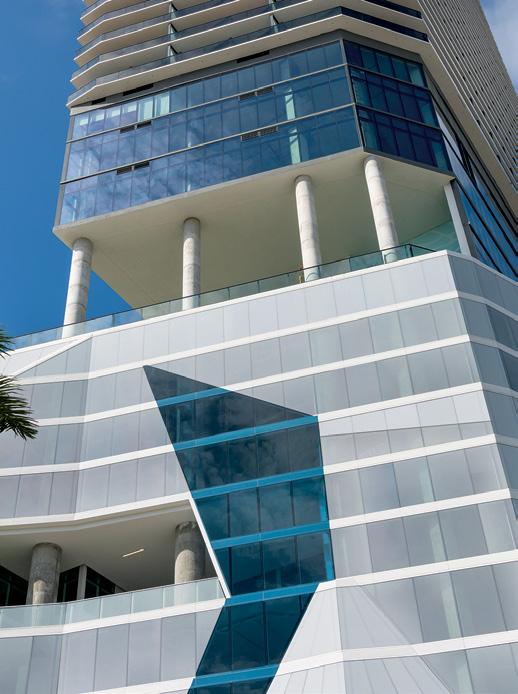
3 minute read
Miami Into the Wild Blue
There is a famous scene in "Raiders of the Lost Ark" that, to me, captures the excitement, energy, and adventure that aviation has come to define for Greater Miami: From a unique geographical location, the ability to fly to exotic destinations for business, adventure and, in many cases, fortune.
As you will remember, Indiana Jones (Harrison Ford) is given the task of finding the Lost Ark of Antiquity. He departs, not from a major airport, but from the water on a Pan Am World Clipper. The plane is filled with businessmen, spies, and various ne’erdo-wells, all wealthy individuals because, at the time, flying (in the late 1930s and early 1940s) was not yet mainstream.
My first thought was, good Lord, this could be Dinner Key in Miami. It looked identical. I have come to think of that scene as a metaphor for what Miami was and has become due to the aviation industry: An amazing challenge filled with intrigue, danger, awe, and huge reward.
Aviation and Miami are close relatives. Those who pioneered modern-day aviation as an industry have Miami roots and displayed the same qualities we write about in each issue of Global Miami: innovators willing to take risks. Their efforts worked with the ultimate result being present-day Miami International Airport, which traces its origins back to the birth of modern-day aviation in early part of the 20th century.
Then, like now, the city fathers knew how to promote. The “A” list of famous aviation folks enlisted to champion Miami included: Glen Curtiss, The Wright Brothers, Charles Lindbergh, Amelia Earhart, and Eddie Rickenbacker, to name just a few. They would perform at “Air Meets,” the first of which was produced by Everst G. Sewell, who was president of the Merchants Association in 1911 and later became mayor of Miami. Thousands would show up in open fields to get a glimpse of a plane, a famous pilot, an amazing woman aviator, and, of course, the brothers who created the first flying machines. Some even bought $100 tickets for a 15-minute ride.
Miami International Airport got its start a few years later, when Pan Am shifted operations from Key West (for flights to Cuba – we were international even then!) to Miami, purchasing 116 acres in Miami Springs. Pan Am Field, as it was called, started operations in 1928 with the first modern passenger airport in the U.S., complete with terminal building, two runways, and two hangers. In the early 1930s, Pan Am sold the facility to the city, and moved its operations to Dinner Key. There it used the Pan Am Clipper seaplanes featured in Indiana Jones.
Eventually Pan Am stopped flying from Dinner Key, which became Miami’s City Hall. It returned to Pan Am Field, which became Miami’s 36th Street Airport in 1932, and Miami International Airport in 1948. The rest, as they say, is history.
In this issue, we look at the current state of aviation at MIA, as well as the world of private aviation that caters to the global business community. As an economic driver, the airport remains critical, creating jobs, spurring investment, and securing our economic future. Without it, Miami would not be a global city.
PUBLISHER
Richard Roffman
EDITOR-IN-CHIEF
J.P. Faber
SENIOR VP INTERNATIONAL
Manny Mencia
DIRECTOR OF OPERATIONS
Monica Del Carpio-Raucci
ASSOCIATE PUBLISHER
Gail Feldman
DIRECTOR, SALES AND PARTNERSHIPS
Sherry Adams
Amy Donner
Gail Scott
MANAGING EDITOR
Kylie Wang
ASSOCIATE EDITOR
Yousra Benkirane
WRITERS
Doreen Hemlock
Joe Mann
Katelin Stecz
Harriet Mays Powell
Natalia Clement
Amy Poliakoff
ART DIRECTOR
Jon Braeley
PHOTOGRAPHERS
Rodolfo Benitez
Tiege Dolly
PRODUCTION DIRECTOR
Toni Kirkland
CIRCULATION & DISTRIBUTION
CircIntel
BOARD OF ADVISORS
Ivan Barrios, World Trade Center Miami
Ralph Cutié, Miami International Airport
Gary Goldfarb, Interport
Bill Johnson, Strategic Economic Forum
David Schwartz, FIBA
Bill Talbot, Beacon Council
EDITORIAL BOARD
Alice Ancona, World Trade Center Miami
Greg Chin, Miami International Airport
Paul Griebel, World Strategic Forum
Jerry Haar, Florida International University
James Kohnstamm, Beacon Council
John Price, Americas Market Intelligence
TJ Villamil, Enterprise Florida
RICHARD ROFFMAN PUBLISHER GLOBAL MIAMI MAGAZINE
Global Miami Magazine is published monthly by Global Cities Media, LLC. 1200 Anastasia Ave., Suite 217, Coral Gables, FL 33134. Telephone: (305) 452-0501. Copyright 2023 by Global Cities Media. All rights reserved. Reproduction in whole or part of any text, photograph, or illustration without o\prior written permission from the publisher is strictly prohibited. Send address changes to subscriptions@ globalmiamimagazine.com. General mailbox email and letters to editor@globalmiamimagazine.com











